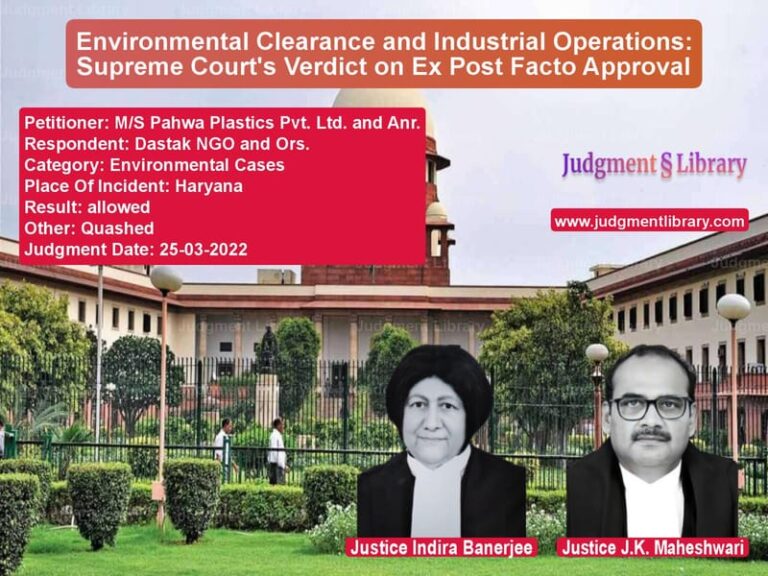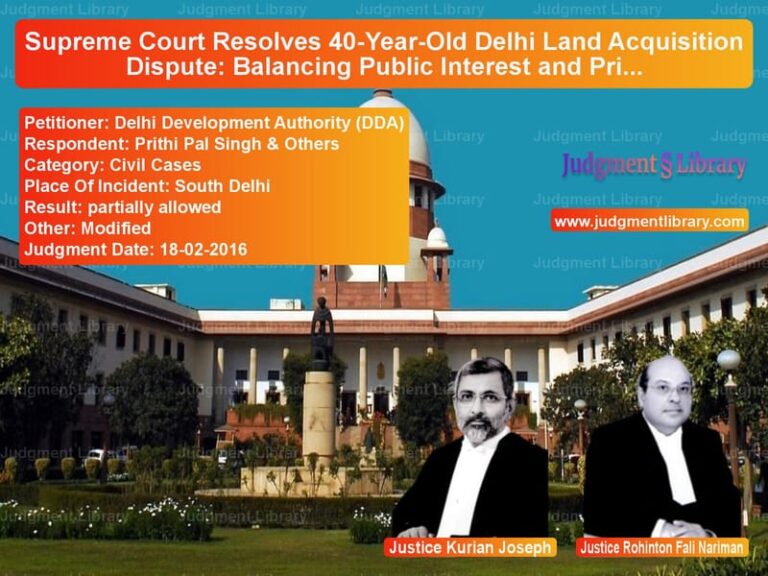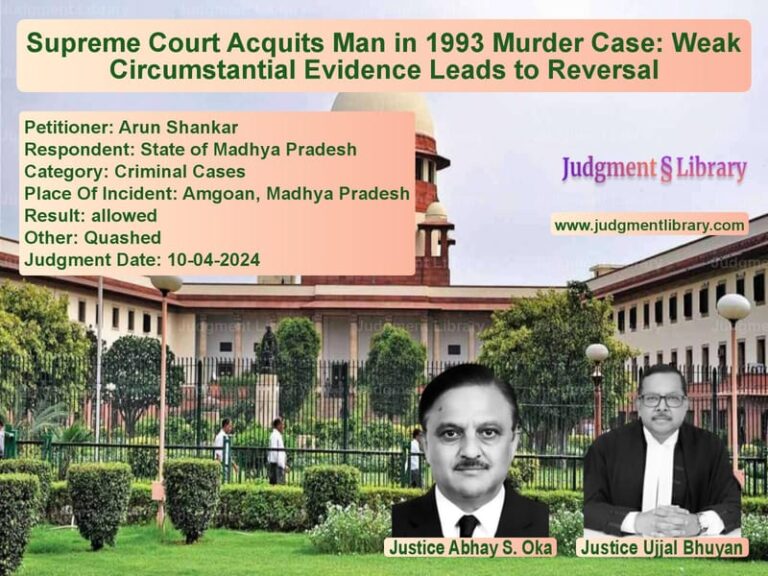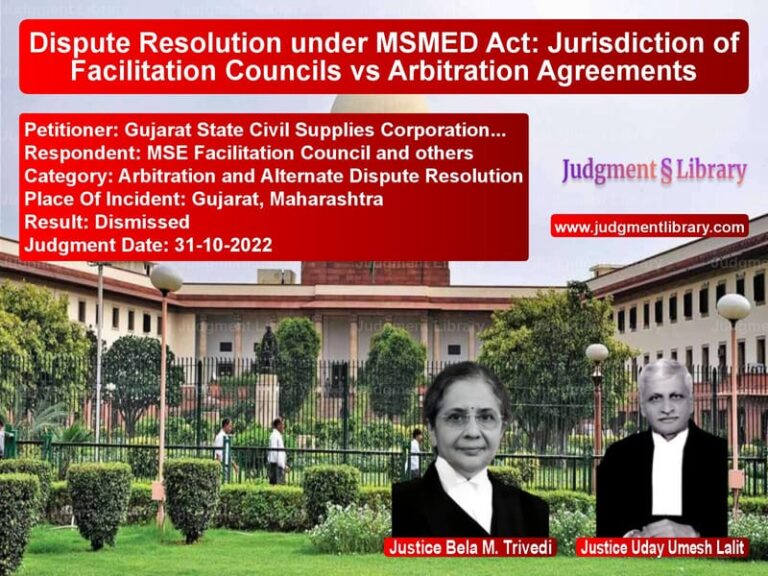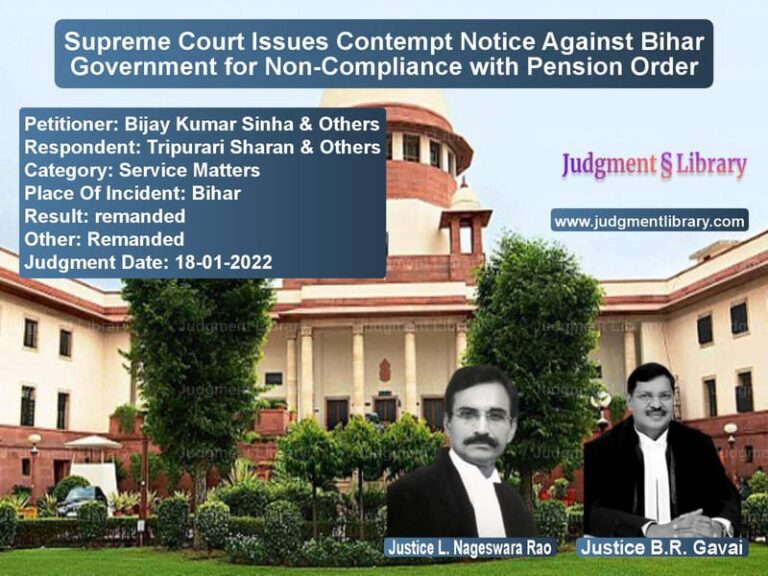Eviction of Tenants by NRIs: Supreme Court Ruling on Punjab Rent Act and Landlord Rights
The Supreme Court of India recently adjudicated a crucial case regarding the eviction of tenants under the East Punjab Urban Rent Restriction Act, 1949, in the matter of Mukesh Kumar v. S. Kuldeep Singh. The case revolved around the rights of Non-Resident Indian (NRI) landlords to recover possession of their property under Section 13-B of the Act and the obligations of tenants in such eviction proceedings. The judgment reaffirms the legal principles governing landlord-tenant relationships and the procedural safeguards in eviction cases.
Background of the Case
The appellant, Mukesh Kumar, was a tenant occupying Shop No. 5 at Guru Amardas Chowk, Model Town, Jalandhar, on a monthly rent of Rs. 225. The respondent, S. Kuldeep Singh, was the owner of the tenanted premises and sought eviction under Section 13-B of the East Punjab Urban Rent Restriction Act, 1949, which grants NRIs the right to recover possession of a property for personal use.
The eviction petition was based on the following grounds:
- The landlord, S. Kuldeep Singh, was an NRI who had returned to India due to financial hardship and wished to establish a business in the property.
- Shop No. 3 in the same building had earlier been sought for eviction, but that petition was dismissed.
- The landlord intended to use the premises for commercial purposes along with his family members.
- He had no other property available in his possession for this purpose.
The Rent Controller ordered eviction, rejecting Mukesh Kumar’s leave to defend application. The Punjab and Haryana High Court upheld this decision, leading to the present appeal before the Supreme Court.
Legal Issues Raised
- Whether the eviction under Section 13-B was legally sustainable.
- Whether the appellant (tenant) had raised valid grounds to contest the eviction.
- Whether the ownership claim of the landlord was legally valid.
- Whether the summary eviction process under Section 13-B violated the rights of the tenant.
Arguments by the Appellant (Mukesh Kumar)
- The tenanted premises were part of a larger building, and eviction of one shop had already been attempted earlier.
- The landlord was not the sole owner and shared the property with family members, making the eviction petition invalid.
- The landlord had no real intent to use the premises for business purposes.
- The eviction proceedings were mala fide and aimed at forcing the tenant to vacate.
- Section 13-B could only be used once in a landlord’s lifetime, and since the landlord’s family had already obtained possession of another shop, this petition was not maintainable.
Arguments by the Respondent (S. Kuldeep Singh)
- The eviction petition was fully compliant with the provisions of the Rent Act.
- The appellant had no legal right to contest the ownership claim as he had earlier negotiated with the landlord for purchasing the premises.
- The Rent Controller and High Court had already examined and dismissed the tenant’s objections.
- The possession of another shop by a family member did not bar the landlord from filing the present eviction petition.
Supreme Court’s Observations
The Supreme Court extensively analyzed the provisions of Section 13-B and Section 18-A of the Rent Act, which govern summary eviction procedures. The Court made the following key observations:
- Section 13-B grants NRIs the right to recover possession of one property for their use.
- The provision does not restrict the eviction right based on whether other family members own separate properties.
- The tenant had failed to provide any substantial evidence to counter the ownership claim.
- The tenant’s plea that the landlord’s earlier petition for Shop No. 3 was dismissed did not impact the validity of the present eviction petition.
- The tenant was inconsistent in his claims—on one hand, he denied the landlord’s ownership, but on the other, he alleged that the landlord had demanded money to sell the property.
- The Rent Controller had correctly rejected the tenant’s application for leave to defend as he did not present any substantial ground.
The Supreme Court also reaffirmed its previous rulings in Baldev Singh Bajwa v. Monish Saini (2005) 12 SCC 778 and Ram Krishan Grover v. Union of India (2020) 12 SCC 506, which held that:
“The presumption raised with regard to the genuine need of the landlord should not be read as an axiom or self-evident truth, which entitles the landlord and mandates the court to pass a decree of eviction. The tenant’s affidavit asking for leave to contest should confine itself to the grounds which the NRI landlord is required to prove, to get ejectment under Section 13-B.”
Final Judgment
The Supreme Court dismissed the appeal and upheld the eviction order, stating that:
- The tenant failed to establish any valid defense.
- The landlord met all requirements of Section 13-B.
- The tenant’s allegations were inconsistent and not backed by evidence.
- Eviction proceedings under Section 13-B are meant to facilitate NRIs in reclaiming property for personal use and should not be obstructed by frivolous defenses.
Implications of the Judgment
This ruling has significant implications for landlord-tenant disputes:
- Strengthens NRI landlord rights – NRIs can effectively reclaim their property under Section 13-B.
- Limits frivolous tenant defenses – Courts will dismiss baseless claims that aim to delay eviction.
- Clarifies summary eviction procedure – The judgment upholds the strict procedural safeguards of Section 18-A.
- Ensures fair application of rent laws – Landlords must comply with the mandatory five-year ownership requirement and can seek eviction only once in their lifetime.
The Supreme Court’s decision reinforces the principle that eviction laws should be interpreted fairly, ensuring both landlord rights and tenant protections within the legal framework.
Petitioner Name: Mukesh Kumar.Respondent Name: S. Kuldeep Singh.Judgment By: Justice Aniruddha Bose, Justice Sanjay Kumar, Justice S.V.N. Bhatti.Place Of Incident: Jalandhar, Punjab, India.Judgment Date: 05-10-2023.
Don’t miss out on the full details! Download the complete judgment in PDF format below and gain valuable insights instantly!
Download Judgment: mukesh-kumar-vs-s.-kuldeep-singh-supreme-court-of-india-judgment-dated-05-10-2023.pdf
Directly Download Judgment: Directly download this Judgment
See all petitions in Landlord-Tenant Disputes
See all petitions in Property Disputes
See all petitions in Specific Performance
See all petitions in Judgment by Aniruddha Bose
See all petitions in Judgment by Sanjay Kumar
See all petitions in Judgment by S.V.N. Bhatti
See all petitions in dismissed
See all petitions in supreme court of India judgments October 2023
See all petitions in 2023 judgments
See all posts in Civil Cases Category
See all allowed petitions in Civil Cases Category
See all Dismissed petitions in Civil Cases Category
See all partially allowed petitions in Civil Cases Category


